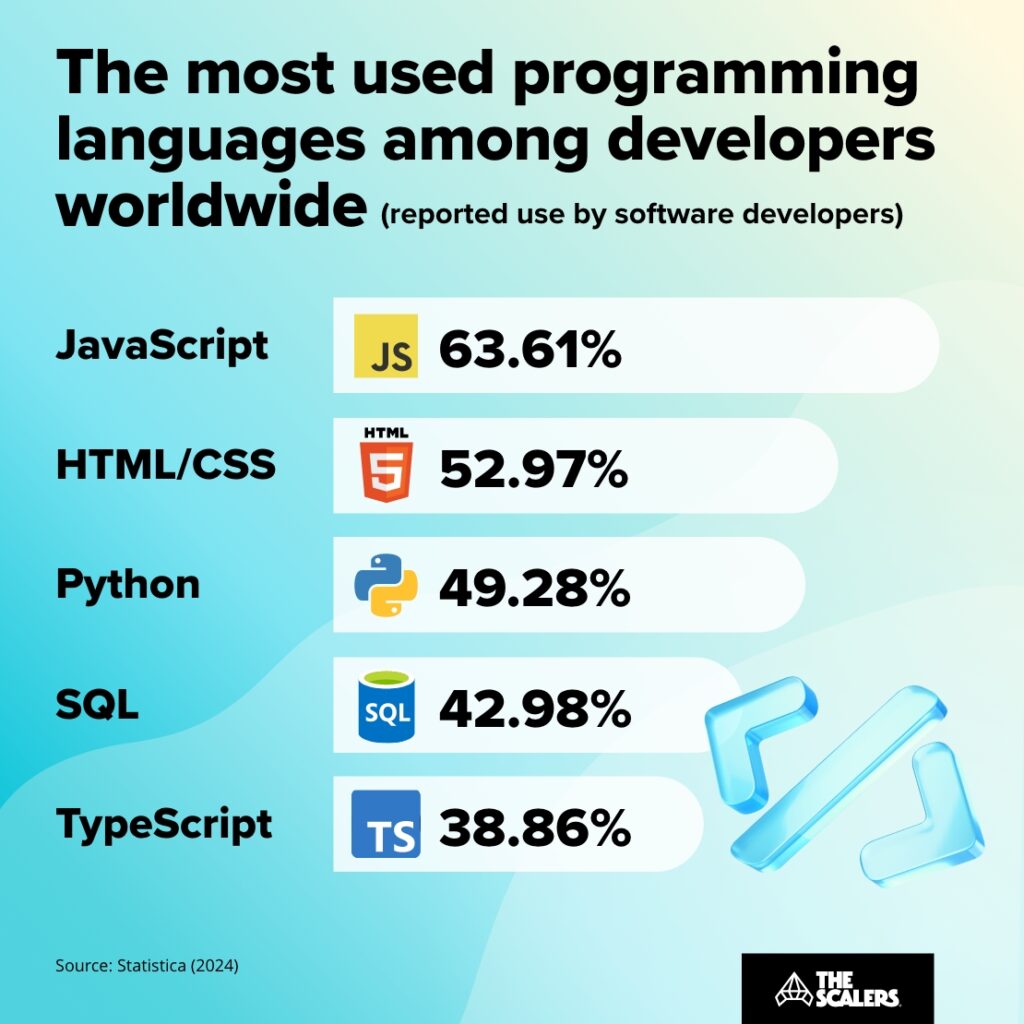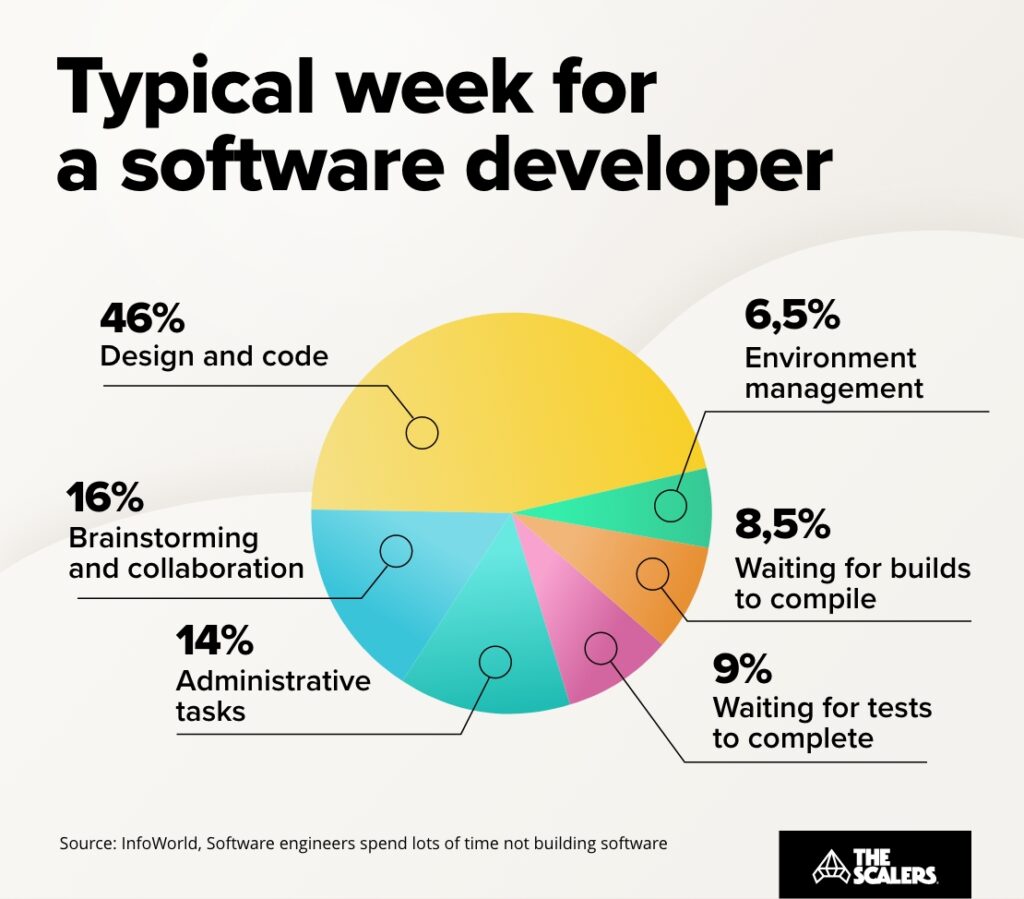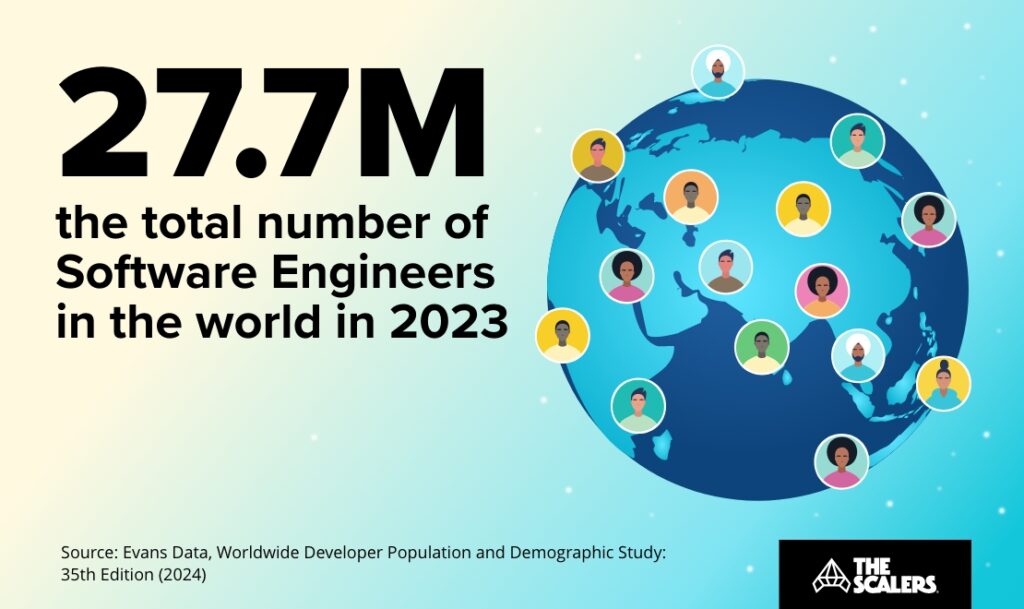Software Developer and Software Engineer: you might consider them to be one and the same. While the two professions do cross over, there are distinct differences that businesses ought to consider before hiring one over the other.
In this article, we’ll explore both professions, their roles, core technical competencies, career paths, salaries, market projections, education, differences, and similarities, drawing upon our experience building 80+ dedicated dev teams.
The role of a Software Developer
A Software Developer focuses on the specific task of coding and programming to create, test, and maintain software applications tailored to meet user needs. They engage deeply with the technical aspects of building software, from writing code to debugging, and often collaborate within teams to deliver software that aligns with specified requirements and functionalities.
There are different specialisations within software development: front-end, back-end, full-stack, and mobile.
- Front-end developers focus on building the visual and interactive elements of a website or application that users interact with directly.
- Back-end developers handle the server-side of web applications, managing the database interactions, user authentication, server, network, and hosting environments.
- Full-stack developers have the technical skills to work on both the front-end and back-end, handling the entire spectrum of development tasks from user interface to server-side logic.
- Mobile developers specialise in creating software for mobile devices, designing and building applications specifically optimised for iOS, Android, or other mobile platforms.
Core Software Developer skills include the ability to write clean, efficient code in various programming languages, like Python, Java, JavaScript, and C#. They must also possess strong problem-solving capabilities to debug and optimise software, an understanding of algorithms and data structures to design effective solutions, and proficiency in database management and manipulation using SQL or NoSQL databases.

Furthermore, front-end developers should generally be competent in Version Control/Git, Bootstrap, and Browser Developer Tools. Back-end developers tend to possess skills in Python, R, and/or PHP. C#, Java, and Objective-C are generally utilised by mobile developers, although with some crossover between specialisations.
The career path of a Software Developer
The U.S. Bureau of Labor Statistics (BLS) anticipates that software development jobs will increase by 25% between now and 2032. Further contributing to the field’s promise, Software Developers earn slightly more than twice the national average salary in the United States, and even more so in the United Kingdom — and salaries are only projected to increase from here.
The careers of Software Developers will look different depending on the specialisation they choose, their level of education, and the industry in which they work.
Entry-level positions may focus on learning and mastering coding skills under supervision, while more senior roles involve leading development projects, designing complex systems, and mentoring junior developers. As developers gain experience, they can advance to roles such as senior developer, team lead, or even Chief Technology Officer (CTO), overseeing an organisation’s entire technological framework.
Here’s a brief overview of the general career stages of a Software Developer:
- Education: Typically involves obtaining a degree in computer science, Software Engineering, or a related field, which provides foundational knowledge in programming, algorithms, and systems design. Today, many also opt for bootcamps or online courses to gain specific technical skills.
- Internship/entry-level Software Developer: Entry into the professional world often starts with an internship or as a junior developer, where the focus is on applying theoretical knowledge in real-world scenarios, learning from senior developers, and beginning to handle simple coding tasks and bug fixes.
- Junior Software Developer: At this stage, developers have some experience and are proficient in at least one programming language. They work on smaller modules of larger projects, contribute to team meetings, and continue learning about new technologies and development practices.
- Senior Software Developer: Senior developers are responsible for writing more complex code, overseeing the technical aspects of projects, and making architecture decisions. They often mentor junior developers and may lead specific project components.
- Development team lead: Team leaders oversee a team of developers, managing the day-to-day technical activities and ensuring project milestones are met. This role involves strategic planning, resource allocation, and interfacing with other departments to align project goals with business objectives.
- Chief Technology Officer (CTO): A CTO oversees the company’s technological needs as well as its research and development. This top-level position involves setting technical strategies, innovating with new technologies, managing the tech team’s dynamics, and often contributing to the executive management team’s decisions.
A day in the life of a Software Developer
A Software Developer’s day varies significantly depending on their role and the phase of the project (sprints) they are working on.
Typically, a developer’s day starts with a quick check of emails and communication tools to catch up on updates from team members, especially if they’re working in a global team with different time zones — as is increasingly commonplace for Software Developers. This is followed by a stand-up meeting: a brief daily team meeting used to discuss progress and immediate plans. Here, developers report what they completed the day before, what they plan to work on today, and any blockers they might face.
After the stand-up, developers engage with their main tasks for the day. For a front-end developer, this might involve designing or refining the user interfaces or integrating APIs that connect front-end to back-end services. Back-end developers might spend their day optimising database queries, writing backend logic, or setting up server-side frameworks. A full-stack developer might juggle both front-end and back-end tasks, switching contexts as the project demands. Throughout the day, developers often engage in coding, debugging, and testing their work to ensure it meets the required standards and functions as intended. They also participate in code reviews, providing and receiving feedback to improve code quality and maintainability.
Additionally, developers frequently update project management tools to track their progress, collaborate with other team members through pair programming or group problem-solving sessions, and possibly engage in further learning — whether through formal training or self-study — to keep up with new technologies and best practices in the field.

The day often ends as it began, with updates to ensure that the team remains on the same page and any significant findings or issues are communicated effectively.
The role of a Software Engineer
A Software Engineer applies engineering principles to design, develop, and implement software systems and solutions. They focus on the entire software development lifecycle — from conceptual design to maintenance and support. They work closely with clients, managers, and other stakeholders to define system requirements and integrate those requirements into a cohesive software solution.
There are various specialisations within Software Engineering. Like Software Developers, engineers can focus their careers on back-end, front-end, full-stack, or mobile development. However, given the broadened nature of Software Engineering, they might also specialise in areas such as systems engineering, DevOps, cybersecurity, or embedded systems.
- Systems engineers design and integrate complex software systems, ensuring they function seamlessly within larger IT infrastructures. They focus on high-level architecture, scalability, and reliability of systems.
- DevOps engineers bridge the gap between development and operations, focusing on automating and streamlining the software delivery process. They work with tools and practices that support continuous integration, continuous deployment (CI/CD), and infrastructure as code.
- Cybersecurity engineers specialise in protecting software systems and data from cyber threats. They design secure software architectures, conduct vulnerability assessments, and implement security measures to safeguard applications and networks.
- Embedded systems engineers develop software for specialised hardware systems, often used in industries like automotive, healthcare, and telecommunications. These systems require precise, real-time performance and integration with physical components.
This is just a small handful of examples; other Software Engineering specialisations include cloud engineering, artificial intelligence (AI) and machine learning (ML), network engineering, software architecture, and database engineering, among others. And as the field continues to develop, more specialisations arise while existing ones adjust.
Core Software Engineer skills include proficiency in multiple programming languages, mastery of algorithms and data structures, understanding of software development methodologies, knowledge of databases and SQL, and familiarity with version control systems, among other soft skills.
The career path of a Software Engineer
Software Engineering can offer a lucrative, engaging career. The average Software Engineer salary in the U.S. is $136,247, while those in the UK can expect to earn an average of £46,886. Moreover, in Australia, the average salary is $125,000 Australian dollars (approximately $83,000 USD). Naturally, those fulfilling senior positions have the potential to surpass these figures: U.S. CTOs, for example, earn an average of $299,492.

Like software development, the career of a Software Engineer will depend on education, specialisation, and work preferences more generally. However, there are commonalities that Software Engineers share in common irrespective of these factors:
- Training: Software Engineers generally have a bachelor’s degree in Software Engineering, applied computer science, data science, or similar.
- Up to three years: Software Engineers entering the profession typically spend up to three years building, launching, and debugging systems or applications as entry-level engineers.
- Three to five years: After gaining initial experience, the next step is becoming a senior Software Engineer, where you may begin overseeing other engineers.
- Six to nine years: With six to nine years of experience, you may progress to a tech lead position, a managerial role where you will likely manage a team.
- 10+ years: With over 10 years of experience, you may advance to roles such as engineering manager or VP of engineering, where you take ownership of processes or products. At this level, there is also the potential to become a CTO, the highest technology executive position in a company — responsible for overseeing the organisation’s research and development (R&D) and technological needs.
A day in the life of a Software Engineer
A Software Engineer’s average day is generally a mix between reviewing code, writing code, collaborating cross-functionally, and engaging in meetings.
More specifically, they may focus on designing and implementing software solutions, debugging and optimising code, conducting code reviews to ensure quality, and participating in architectural discussions. Moreover, engineers commonly coordinate with product managers to understand requirements and work with quality assurance teams to resolve issues and improve the software’s performance and reliability.
In doing so, Software Engineers may employ one or several of the following tools:
- Integrated Development Environments (IDEs): Visual Studio, IntelliJ IDEA, Eclipse
- Version control systems: Git, GitHub, GitLab, Bitbucket
- Project management tools: Jira, Trello, Asana
- Continuous Integration/Continuous Deployment (CI/CD) tools: Jenkins, Travis CI, CircleCI
- Collaboration and communication tools: Slack, Microsoft Teams, Confluence
- Code review tools: Crucible, GitHub Pull Requests, Gerrit
- Testing frameworks: JUnit, Selenium, PyTest
- Database management systems: MySQL, PostgreSQL, MongoDB
- Cloud services: AWS, Google Cloud Platform, Microsoft Azure
- Containerisation and orchestration tools: Docker, Kubernetes
Software Engineers vs. Software Developers: What’s the difference
The key difference between a Software Engineer and Software Developer is this: It’s generally considered that Software Engineers take a broader, more systematic approach — focusing on the entire system’s architecture and integration. Software Developers, on the other hand, primarily concentrate on writing and maintaining the specific code and features within that system.
With that said, there’s often overlap between the two professions — so much so that the terms are commonly used interchangeably.
Other differences between Software Engineers and Software Developers are as follows.
| Comparisons | Software Developers | Software Engineers |
| Average pay | $111,845 | $136,247 |
| Primary day-to-day responsibilities/key competencies | Coding and programming. | Coding, programming, system architecture design, and integration. |
| Surrounding legislation | As “engineer” is a legally-specific term in some jurisdictions, such as Canada, others performing similar roles may be titled as Software Developers. | In certain jurisdictions, the term “engineer” is legally restricted. As a result, the title of Software Engineer is reserved for licensed professionals. |
| Education | Bachelor’s degree in Software Engineering, applied computer science, data science, or similar. | Bachelor’s degree in Software Engineering, applied computer science, data science, or similar, with a focus on system engineering. |
| Industry-to-industry | In critical infrastructure sectors, “developers” generally focus solely on executing software specifications. | In critical infrastructure sectors like aviation, health care, and energy, the title “Software Engineer” typically refers to professionals who combine programming skills with specialised industry knowledge. |
Although more citizens in the US, UK, and Australia are entering both professions each year, finding quality employees at affordable rates in the local market is a constant challenge. To help overcome these issues, more and more businesses are choosing to build offshore teams.
The Scalers: A better way to expand your IT team
At The Scalers, we help you build a dedicated engineering team with world-class Indian tech talent and help run your operations — HR, administration, reporting, and more. The result: scalability and increased in-house competency.
As Daniel Barnes, Global Head of Operations at Preqin, puts it:
“We couldn’t find the right talent in London and worked with another partner in India at first. It didn’t work. Then The Scalers came and it was a different planet.”
We handpick the top 1% of Bangalore’s engineering talent and put them in contact with you. That way, you can leverage the potential of a region that produces 90K new Software Engineering graduates every year.
Learn more about our processes, what you gain by offboarding, Bangalore’s software talent, and more.
Key takeaways:
-
1
Software Developers and Software Engineers are two similar jobs that are sometimes used interchangeably
-
2
The main difference between the two professions is that Software Engineers focus more on the whole system and architecture in addition to coding abilities.
-
3
Both professions demand high salaries and Software Engineers can expect higher average salaries due to the extra knowledge and education required for their roles.
-
4
Setting up an offshore development team is the most cost-effective way to get talented Software Engineers and Developers.
If you’ve found this article useful, you’ll probably enjoy one of the other articles below on software development, offshoring and IT leadership.
Build Your Team,
Not Just a Contract
With The Scalers’ offshore dedicated development team, you get engineers who join your workflow for the long run. Grow steadily, stay flexible, and work with people who care about the product as much as you do.










